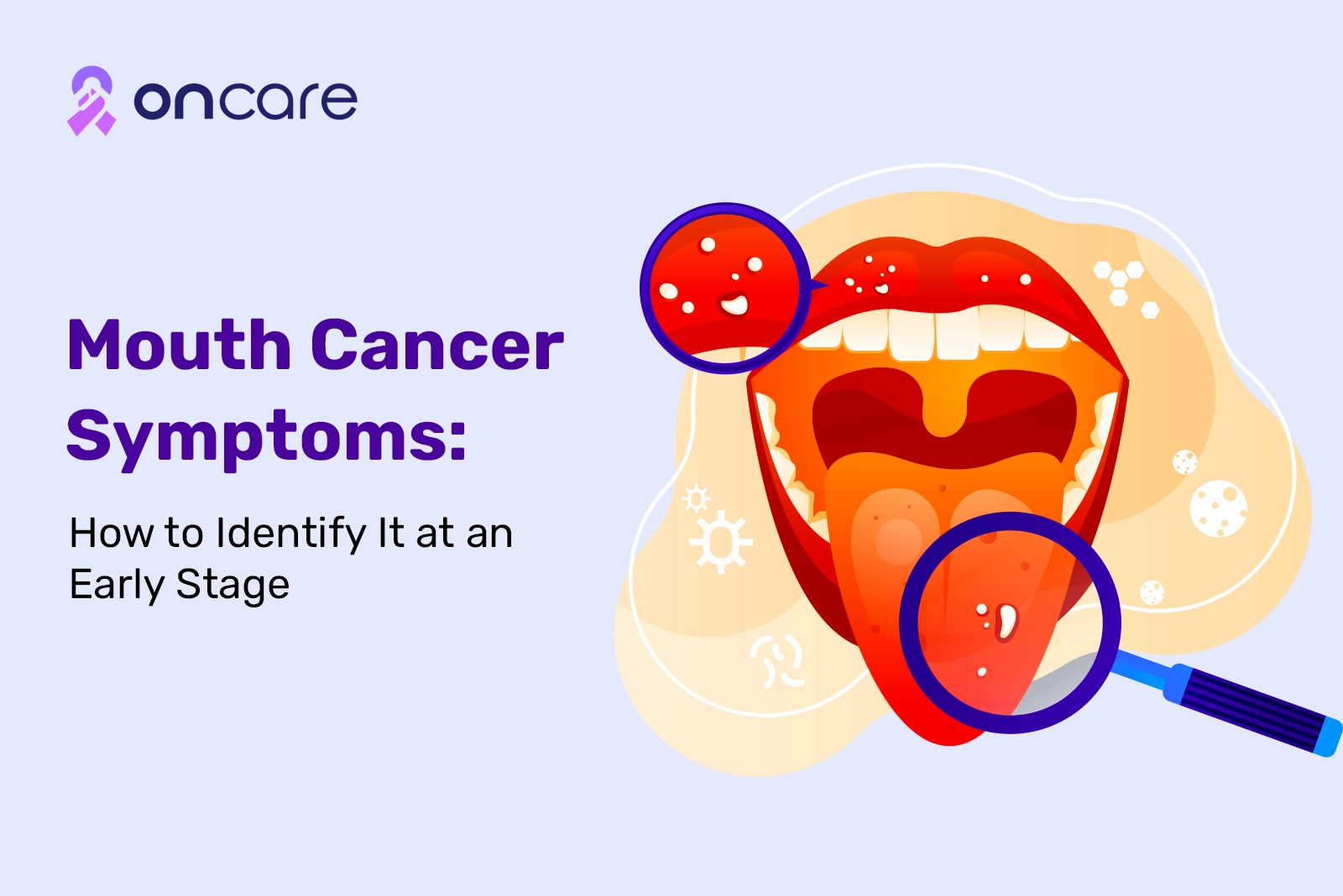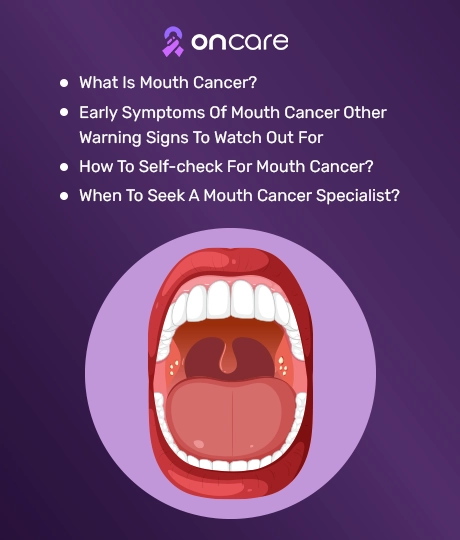Mouth Cancer Symptoms: How to Identify It at an Early Stage

Mouth cancer is otherwise called oral cancer. It is a serious health concern that thousands of people suffer from. Finding out about its earliest signs can help improve the treatment outcomes and, eventually, one's quality of life. Early detection ensures the recovery is well too. Nowadays, the best you can do is be good with your oral health. Those who want expert advice on mouth cancer and related care must consider Oncare. With a team of experienced oncologists, we are a leading name for top-notch mouth cancer treatment in Delhi. We give you holistic options on diagnostics and treatments so you get the best care possible. Our commitment lies in guiding patients in each step of their journey toward better recovery from oral cancer.
This article is a comprehensive guide to knowing mouth cancer symptoms and how to identify them at an early stage.
What Is Mouth Cancer?
Mouth cancer means malignant growth in any part of the oral cavity. This includes the lips, tongue, floor of the mouth, gums, inner lining of the cheeks, and even the hard palate. This cancer happens when the cells in these areas begin to grow abnormally and without control. Squamous cell carcinoma is the most common kind of mouth cancer that happens in the flat/ thin cells lining the mouth and throat.
A lot of factors are behind the development of this cancer. The use of tobacco in the form of cigarettes and smokeless tobacco is a great risk factor. Increased alcohol consumption and HPV contraction also increase the chances of this cancer. Some people might also get it due to their genetic predisposition.
Understanding mouth cancer is the first step toward detection and prevention. Regular check-ups at Oncare ensure you are receiving accurate diagnosis and care for your individual condition. We specialize in a comprehensive range of mouth cancer treatment options to ensure you receive personalized attention till full recovery.

Early Symptoms Of Mouth Cancer
Here are some early symptoms of mouth cancer you should know about:
Persistent Mouth Sores Or Ulcers
The most common signs of mouth cancer are sores and ulcers that do not seem to heal. These lesions keep appearing on one’s tongue, gums, or inner cheeks. Usually, mouth sores are benign and are a result of bites/ irritation. However, if these just keep recurring, it is important for you to get them checked.
We at Oncare recommend timely appointments when you spot such recurring lesions to ensure you get a deeper evaluation done. Our expert oncologists ensure you can safely distinguish between harmless conditions and potential malignancies.
Unexplained Bleeding Or Pain
Another warning sign for mouth cancer can be inexplicable bleeding or persistent pain in the mouth. This pain is not always severe but is rather continuous and does not respond to usual pain relief remedies. Even minor bleeding that occurs without a cause needs to be taken seriously. It can be an indication of cancerous changes within the oral tissue.
White/Red Patches On Gums
White or red patches in your mouth can also be an issue. These usually occur on the gums, tongue, or inner cheeks. These can be an early indicator of cancer. The patches appear as isolated spots or a widespread area of discoloration. Red patches are often more concerning in this case.
Lumps/ Thickening In Mouth
Any unusual lump or thickening in the tissues of the mouth needs to be looked into as well. These feel hard/ firm and usually show up on the tongue, lips, or inside the cheeks. A lump is not formerly painful so you need to perform self-examination for a good while. Persistent lumps should be looked into by an oncologist as soon as possible.
Other Warning Signs To Watch Out For
Here are some more warning signs to watch out for in case of mouth cancer:
Difficulty Chewing/ Swallowing
Oral cancer affects the muscles and tissues that are involved in chewing and swallowing. Patients usually report a sensation of food sticking to the throat or discomfort during meals. This symptom is problematic because it troubles your usual eating routines. Difficulty swallowing along with usual symptoms should not be overlooked.
Numbness/ Tingling Of Mouth
Tingling or numbness of the mouth are less discussed symptoms of oral cancer. This can be subtle at first but grows with time. Numbness can often mean the movement of cancerous cells across surrounding tissues.
Sudden Weight Loss And Fatigue
Unintentional weight loss and persistent fatigue are symptoms that can indicate a later form of mouth cancer. These do not happen on their own but along with other oral symptoms. Unexplained changes in weight or the body as a whole should be looked into promptly anyway.
How To Self-check For Mouth Cancer?
Here is how you can self-check for mouth cancer:
Regular Oral Examinations
Make it a habit to inspect your mouth by yourself. Keep this routine to at least once a week. Look into the state of your lips, tongue, gums, the roof, and floor of your mouth in the mirror. A small ulcer or patch is not an immediate cause for alarm but can be if it persists for more than 2 weeks.
Checking For Unusual Lumps, Discoloration, or Non-healing Sores
When you are self-checking, pay close attention to any lumps or thickened areas within the mouth. Additionally, look into any changes in the color or texture of your mouth tissue. Recording your observation with photos and dates also helps in case you notice an abnormality. Early detection is the key to getting the right care that actually helps curb the symptoms and the disease as a whole.
When To Seek A Mouth Cancer Specialist?
Here is how you will know when to seek an oncologist:
Symptoms Lasting More Than 2 Weeks
If you notice any sores or lumps that have not healed for 2 weeks, it is time to seek medical advice. Persistent symptoms are often the first indications of something serious going on in the body. Early consultation ensures your diagnosis is prompt and your treatment is greatly effective in battling against mouth cancer.
Inquiring Into Diagnosis (Biopsy/ Imaging)
A definitive diagnosis of mouth cancer can be done usually through a biopsy. Here, a small sample of the affected tissue is taken for examination under a microscope. Additionally, imaging tests like CT scans, MRI, or PET scans are also used to find out the extent of the disease. If you wish to know more about the nature of your symptoms, make sure you are having frank conversations with the concerned oncologist. Oncare has a team of dedicated oncologists that ensure you are not only getting expert diagnosis but also assuring advice as to how to move forward with your mouth cancer treatment.
Need For Early Medical Intervention
The success of mouth cancer treatment amplifies when you intervene in the status quo early on. Waiting too long to go to an oncologist will allow the cancer to progress. This reduces the chances of getting faster treatment. If you are experiencing a combination of the symptoms as stated in this article, having an appointment with an oral cancer specialist will help you a lot. Medical intervention at the earliest ensures the treatment outcomes are in your favor and the long-term effects of the disease can be curbed too.
Conclusion
Finding out the earliest symptoms of mouth cancer is important so you can get good treatment and recover faster too. Persistent symptoms should never be overlooked and should be checked promptly. Routine self-checks and professional evaluations ensure you stay healthy and any anomaly can be spotted as early as possible. In case of sudden changes in your oral health, contact a trusted oncologist immediately. Oncare is a dedicated facility that provides cutting-edge mouth cancer care and personalized treatment in Delhi. Our oncologists are committed to early detection using advanced diagnostic tools. We opt for a compassionate approach to ensure we remain a trusted choice when you are facing this challenging condition